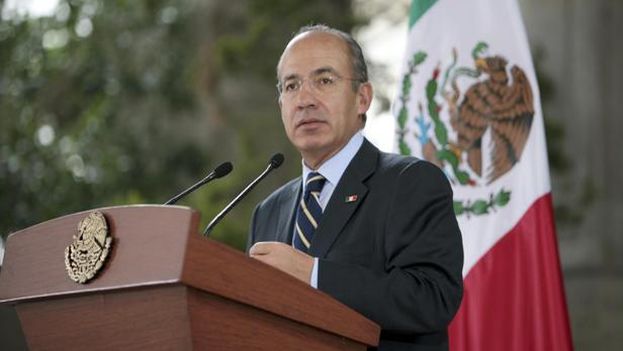
![]() 14ymedio, Havana, 22 February 2017 — Just five years ago, Mexican President Felipe Calderón was greeted warmly in Havana during an official visit. However, this week the now former president was denied entry to the island to participate in the Oswaldo Payá “Freedom and Life” awards to be held this Wednesday.
14ymedio, Havana, 22 February 2017 — Just five years ago, Mexican President Felipe Calderón was greeted warmly in Havana during an official visit. However, this week the now former president was denied entry to the island to participate in the Oswaldo Payá “Freedom and Life” awards to be held this Wednesday.
“I deeply regret not being able to be with them at this tribute” to the deceased opponent, the politician conservative National Action Party (PAN). “The Cuban immigration authorities asked Aeromexico” not to seat me on the flight, telling them I was an “inadmissible passenger” on Tuesday.
Before the trip, the former president alerted the Mexican Foreign Ministry of his intention, because he did not want to “arrive as if he were a tourist”
Prior to the trip, the former president alerted the Mexican Foreign Ministry of his intention, because he did not want to “arrive as if he were a tourist.” He reported on his departure to Cuba’s ambassador to Mexico, Pedro Núñez, and his country’s representative in Havana, Enrique Martínez.
This is the first time that the Plaza of the Revolution has prevented a former Mexican president from entering the country, an event that has raised a diplomatic dust storm, including a tweet from the Mexican Foreign Ministry in which he “regrets the decision of the Government of Cuba not to authorize the visit to Havana of former President Felipe Calderón.”
Calderón recalls that he supported “Oswaldo Payá many years ago without having met him, by spreading the Varela Project and collecting signatures in Mexico for him.” In those years he saw “with great sadness how the Cubans involved in the project were persecuted.”
The politician evokes with special aggravation the Black Spring of 2003 and his indignation to learn that 75 dissidents had been arrested and sentenced to long prison terms under the so-called Gag Law.
In one of his previous visits to the island, Calderón asked President Raúl Castro to let him speak with Oswaldo Payá, leader of the Christian Liberation Movement (MCL). However, “the Cuban government always resisted,” he recalls. He believes that the “diplomatic complications obstructed” this longed-for encounter.
“I ask the Cuban government to rectify this absurdity,” said the former president, who maintains his idea of meeting “with Oswaldo’s family” whom he admired for being “an example of congruence, civility and love of neighbor.”
The former Chilean foreign minister Mariana Aylwin experienced a similar situation on Wednesday when she was prevented from boarding a flight from her country to participate in the ceremony where a posthumous recognition will be made to her father, Patricio Aylwin, the first president under democracy in Chile after the dictatorship of Augusto Pinochet.
The Chilean Foreign Ministry said that the government “will make the Cuban authorities aware of their displeasure at this action” because the purpose of Mariana Aylwin’s trip “was to receive from a civic organization the testimony of recognition of her father… The exercise of this right should not be impeded, especially when in Chile there have been various acknowledgments of Cuban historical and political figures.”
According to Rosa María Payá, the Uruguayan Luis Almagro, has confirmed his presence in the event today to receive the award
According to Rosa María Payá, Uruguayan Luis Almagro, Secretary General of the Organization of American States (OAS), has confirmed his presence at the event today to receive the Freedom and Life Award for his “outstanding performance in defense of democracy,” although he has not made a statement on the matter.
The award ceremony, which is due to be held on Wednesday, is being led by the Latin American Youth Network for Democracy, an organization headed by Rosa María Payá, daughter of the late dissident.
Nationally, the government also prevented independent journalists Sol García Basulto and Henry Constantin from Camagüey from traveling to Havana, where they planned to fly to attend the award ceremony. The Inter American Press Association (IAPA), of which Constantin is regional vice president for Cuba, issued a protest statement demanding the release of the reporter, who until yesterday remained detained.
